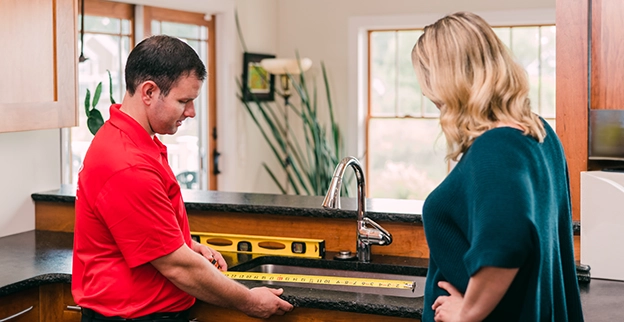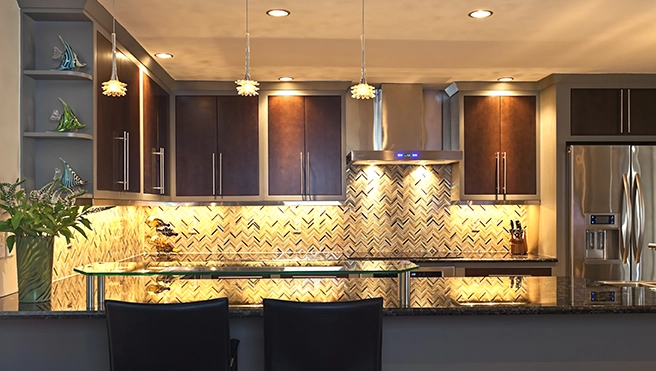Considering Mr. Handyman for your countertop installations, Dallas? Then you need to know more about how our service works. Installing your countertops is one of the final steps taken when remodeling or building your kitchen or bathroom; however, it’s also possible for homes that already have existing countertops and want new ones. Seeking countertop replacement instead? The installation process will look like this:
- Prep the countertop area. Remove all small appliances and clear surrounding items and furniture to allow for an easy installation. We will also need to shut off gas and water lines and cover electrical outlets.
- Remove the sink. This consists of detaching the fasteners that attach the sink to your countertops, prying up the sink, and peeling off any adhesive around it.
- Remove the old countertop. Depending on what it’s made from, removing the old countertop may be as simple as using a sharp instrument to cut the old silicone adhesive that attaches the countertop to your cabinets.
- Dry fit the new countertop. To make sure the counter fits the specifications of your cabinets and kitchen, we’ll place the new counter on top before applying any type of adhesive. The material should fit closely against the wall, but if it doesn’t, we’ll use a sander to ensure that it does.
- Attach the new countertop. This involves applying caulk or adhesive to the tops of your cabinets and ensuring everything is properly aligned. The adhesive will need to dry for a few hours before we can check our work. If, after drying, we find there are holes, we’ll go back and fill them to ensure a flawless finish.
- Seal the wall joint and install the backsplash. If you would like a backsplash, ask about our backsplash installation service along with countertop installation. The two go hand in hand to create a beautiful finish.
- Reinstall appliances. This is the final step. We will hook everything in your kitchen and bathroom back up, but be sure to refrain from using your sink for a full 24 hours after installation.
What about if you’re building your kitchen or bathroom from the ground up? Then we’ll need to do a bit more on the template and design side of things. This involves planning out where your sinks and faucets will be installed and what their measurements are. Other elements we will need to consider include:
- Overhangs: Will your countertop overhang your cabinet? If so, they might need bracing. Overhangs from 6 to 13 inches may not require bracing, but any longer may require a bracket for added support.
- Counter height: How high would you like your counter to come up? This depends on personal preference and if you or your family require any special accommodations. The cabinets you have chosen for your kitchen or bathroom will determine how high your counter is, and if you are also installing a bar, you will need to ask your contractor to plan for this.
- Added support: While your kitchen cabinets usually provide enough support for your countertops, heavier materials and appliances might compromise the integrity of your cabinets with time.
- Seams: Most counters have seams. Seams are what join the pieces of your countertop together, though seamless units do exist. To make sure your countertop looks great, we need to know where the seams will be.
Types of Materials For Countertop Installation | Dallas, TX
Dallas homeowners take pride in the appearance of their homes, and they know that choosing the right type of countertop material is integral to the overall aesthetic of their kitchen and bathroom. Since they’re now well-versed in countertop installation, Dallas homeowners might be wondering what their material options are. The first thing to know? Each one has its own set of benefits and disadvantages depending on your home and preferences. It’s important to consult a professional installer so that you choose the right one. Read on to discover the most commonly used materials for bathroom and kitchen countertops in the United States.
- Marble: Choose marble countertops if you would like a completely unique countertop unlike anyone else's! Each slab of marble is totally unique, but it can be quite expensive. It’s also easy to damage and expensive to repair, but boy, does it look exquisite!
- Quartz: A quartz countertop is non-porous and resistant to scratching and staining. Quartz is a beautiful option for your kitchen counters and bathroom vanities and comes in a variety of colors. However, it’s also one of the more expensive options. Thinking of adding quartz countertops, Dallas? Your local professional will steer you in the right direction.
- Granite: One of the most popular materials for countertop installation Dallas residents often gravitate to. Granite is durable and looks beautiful. It’s heat-resistant and very versatile, with close to 3,000 different colors and types available for locals. As a natural stone, it’s more expensive than other materials and is quite porous. This means it will stain. If you want granite countertops, Dallas, be sure to get to know their pros and cons.
- Ceramic tile: This very easy-to-clean material is perfect for countertops, backsplashes, and floors and is a great alternative to granite. It’s less expensive than natural stone slabs; however, the grout required to lay it is easily stained and needs regular cleaning.
- Laminate: An inexpensive option for Dallas homeowners made from plastic-coated synthetics. Laminate countertops are easy to clean and very versatile, with many color options and patterns. With that said it’s quite easy to damage and often chips.
Other material options include engineered stone, stainless steel, slate, zinc, recycled glass, bamboo, paper composite, and more. Not sure which to choose? Ask your local professional for advice. They’ll take your needs and budget into consideration before showing you your options.


